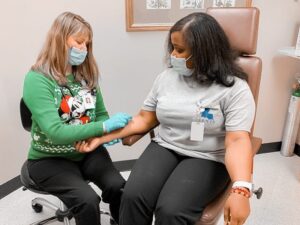Allergies can affect any age group and can contribute to numerous problems such as recurrent ear and sinus infections, chronic nasal congestion, headaches, wheezing, coughing, skin rashes, and sometimes digestive issues. Antigens that are usually not harmful such as dust mites, pet dander, mold, pollen, and food can sometimes be mistaken by the body as harmful and create an overactive immune response.
Various amazing medications have emerged over the last 25 years to treat allergies. There are now antihistamines that don’t cause sleepiness, inhalers that deliver steroids to the airway with little to no absorption in the rest of the body, and more recently developed are injectable biologics that target the different inflammatory signals in the body. While there are effective and safe medication choices available, sometimes this may not be enough to keep someone feeling well long term, or they may have side effects or even financial restrictions.
Environmental controls are also helpful to reduce allergen exposure. These may include: mattress and pillow covers to protect against dust mites, putting pillows and blankets in the dryer on high heat for 10 minutes to kill dust mites, using a HEPA filter in the bedroom, removing house plants to reduce mold, and wearing a mask when performing yard work. Unfortunately, sometimes we do not want to give up a family pet, or attend a school or workplace that doesn’t meet the air quality standards we need. Simply living in a warm tropical environment can create an increase in pollen and mold counts.
Knowing where to turn for help can be confusing but Ear, Nose, & Throat (ENT) doctors can be a great resource as they can provide multiple approaches to help suit the needs of patients of all ages. Not only do ENTs perform surgery and prescribe medications, but they are also specialized in “otolaryngic allergy,” which is allergy specific to problems of the ear, nose, and throat. Diagnosing and managing allergies is one of many ways an ENT can help treat one’s symptoms.
Once an individual has failed these usual measures, allergy testing may be quite helpful. Allergy testing can be done in the form of skin testing or through drawing tubes of blood. Skin testing, however, is still the most accurate. It may not only identify the offending antigens but offer another tool such as immunotherapy in the form of allergy shots or drops to help repair the immune system.
Locally, the ENTs of Louisiana Ear, Nose, Throat & Sinus (LENTS) have allergy departments within their practices in Baton Rouge, Denham Springs, and Zachary that offer various methods of allergy testing and treatment for children and adults. Traditional weekly allergy injections are available at five of their locations and often include hours to accommodate school and work schedules. Alternatively, allergy drops under the tongue are available and scientifically supported. Drops under the tongue, also called sublingual immunotherapy, can be given at home once daily, eliminating trips to the office. This is a great option for those who may not otherwise be able to tolerate injections or have challenges with budgets and time. LENTs ensures medical support staff receives specialized training to provide the highest quality care to improve outcomes. Consulting with an ENT to diagnose and manage ENT-related allergies can be a first step in the journey to a life changing recovery.
Visit the web at lentsmedicalgroup.com for more information and to schedule a consultation.





